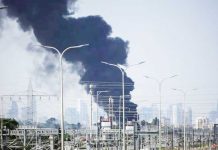 IT’S SIMILAR to the proposed Bangsamoro Basic Law (BBL) that the previous Aquino administration failed to pass due to strong opposition from the Senate.
IT’S SIMILAR to the proposed Bangsamoro Basic Law (BBL) that the previous Aquino administration failed to pass due to strong opposition from the Senate.
But now that the present Senate has adopted the House version of the revived bill, President Rodrigo Duterte will sign it into law before he delivers his third State of the Nation Address (SONA) on July 23.
The bill aims to create the Bangsamoro Autonomous Region (BAR) that would immediately include the present Autonomous Region in Muslim Mindanao (ARMM), Cotabato and Isabela City in Basilan, plus other cities or provinces where there is a local government resolution or petition of at least 10 percent of registered voters asking for their inclusion two months before the plebiscite for the BBL.
One recalls that while former President Benigno Simeon Aquino had asked Congress to pass the BBL before December 2014, questions on its constitutionality and an intervening incident in Mamasapano, Maguindanao derailed its approval in the Senate.
Aquino had intended to hype its peace-keeping effects for his last State of the Nation Address (SONA) in 2015. Unfortunately, the infamous “Mamasapano massacre” on Jan. 25, 2015 – which claimed the lives of 44 members of the Philippine National Police’s Special Action Force (SAF) – scuttled the plan.
The National Bureau of Investigation (NBI) filed before the Department of Justice a case for direct assault with murder against 26 individuals from the Moro Islamic Liberation Front (MILF) and the Bangsamoro Islamic Freedom Fighters (BIFF) but to no avail.
Like Aquino, however, Duterte would have us believe that institutionalizing a new Moro sub-state with broader power under the Islamic Shariah Law would end the decades-long Muslim insurgency.
Oh we of short memory! Don’t we remember that it was out of his peace deal with the Moro National Liberation Front (MNLF) – from where the MILF descended – that President Fidel Ramos signed the law creating the Autonomous Region in Muslim Mindanao (ARMM) in 1996? He appointed MNLF chair Nur Missuari first ARMM governor on the pretext of “lasting peace.”
However, after more than a decade of “reign”, Missuari reinforced his rebellious armed group, culminating in the so-called Zamboanga siege in September 2013 that claimed the lives of 200 – including cops, soldiers, rebels, and civilians.
Christians in Mindanao are therefore naturally opposed to the (BBL) for fear that the ultimate aim of the Moro Islamic Liberation Front (MILF) and other Muslim separatist movements is to steer the entire country into an Islamic theocracy akin to Saudi Arabia, which allows only Islam religion.
These movements feel it’s their birthright to repossess Mindanao. Historically, the Muslim merchants from present-day Malaysia had already saturated the southernmost points in the Philippines for two centuries when Spanish explorers first introduced Christianity in the Philippines. The first Philippine mosque emerged in Simunul Island (now a barangay in Tawi-Tawi) in the mid-14th century.
Our forebears had descended from Bornean, Indonesian and Malaysian immigrants. By the time Portuguese sailor Ferdinand Magellan discovered the Philippines in behalf of the king of Spain in 1521, the Muslims had already asserted their supremacy in Mindanao.
Ergo, if Magellan and the Spanish conquistadors after him had not come as they did, this country could have turned as Islamic as Indonesia and Malaysia.
If indeed the MILF would like to ride on the BBL to transform a portion of Mindanao – if not the entire nation — into an Islamic state, then it would not guarantee peace but, on the contrary, rekindle animosity between Muslims and non-Muslims. God forbid! (hvego31@gmail.com/PN)





